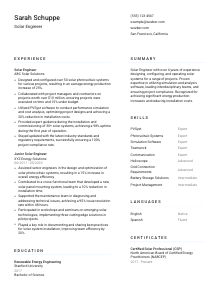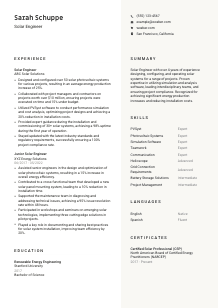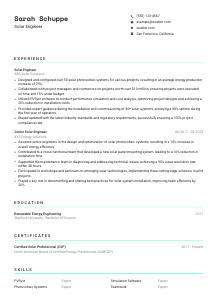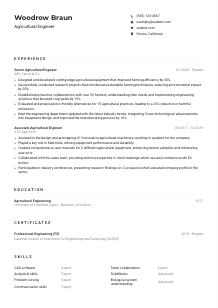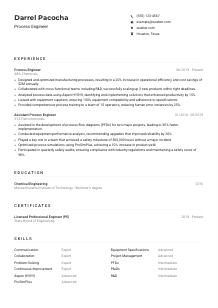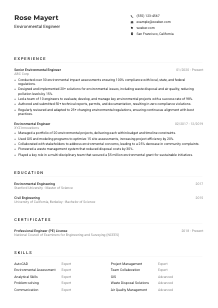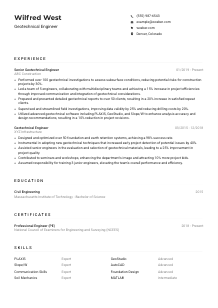Solar Engineer Resume Example
Harnessing sunbeams but your resume leaves you in the shade? Soak up this Solar Engineer resume example, crafted with Wozber free resume builder. See how you can beam your photovoltaic expertise to meet job descriptions, illuminating your career path as brilliantly as the sun!
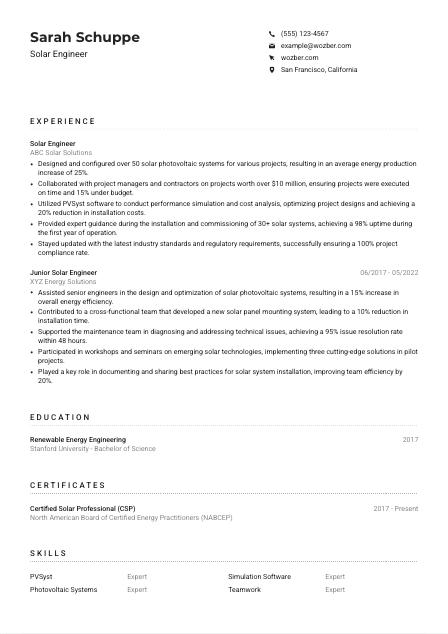
How to write a Solar Engineer resume?
Stepping into the world of solar engineering? Shine bright in the competitive job landscape with a resume that not just reflects your expertise but also speaks directly to the heart of your desired role. Embarking on this journey, we'll wield the power of Wozber's free resume builder to construct a resume that aligns perfectly with the Solar Engineer position, mastering the art of ATS optimization and making you a standout candidate.
Ready to transform sunlight into a spotlight for your career? Let's sculpt your resume into a beacon of opportunity.
Personal Details
Kick off your resume with personal details that capture attention while impeccably matching the Solar Engineer job criteria. Here's how to fine-tune this section to set a professional tone right from the start.
1. Present Your Name with Clarity
Your name is more than an identity; it's the first impression you make. Use a clear, professional font, standing out prominently at the top. Let it be the beacon that guides the hiring manager through your resume.
2. Embrace the Role's Title
Immediately below your name, mirror the job title from the description, in this case, 'Solar Engineer'. This strategic placement not only shows your direct interest in the role but also aids in ATS optimization by matching keywords.
3. Prioritize Essential Contact Information
Ensure your contact information is up-to-date and professional. A phone number and an email address, ideally in the firstname.lastname@email.com format, are essential. Double-check for typos to maintain professionalism.
4. Location Matters
Since the role specifies being located in or willing to relocate to San Francisco, California, make sure to include your current city and state to align with this requirement, further optimizing your resume for ATS filters.
5. Add a Professional Touch
If you have a LinkedIn profile or personal website that showcases your solar engineering projects or professional achievements, include it. Ensure they are current and reflective of your resume's details.
Takeaway
Your personal details section is the gateway to your professional story. Craft it with care, making every detail count. This section is more than a formality; it's the first step in aligning your profile with the solar engineering role you're aiming for.





Experience
The experience section is your solar panel, capturing the rays of your career and converting them into a compelling narrative. Tailoring this section to the job description ensures your resume shines with relevance.
- Designed and configured over 50 solar photovoltaic systems for various projects, resulting in an average energy production increase of 25%.
- Collaborated with project managers and contractors on projects worth over $10 million, ensuring projects were executed on time and 15% under budget.
- Utilized PVSyst software to conduct performance simulation and cost analysis, optimizing project designs and achieving a 20% reduction in installation costs.
- Provided expert guidance during the installation and commissioning of 30+ solar systems, achieving a 98% uptime during the first year of operation.
- Stayed updated with the latest industry standards and regulatory requirements, successfully ensuring a 100% project compliance rate.
- Assisted senior engineers in the design and optimization of solar photovoltaic systems, resulting in a 15% increase in overall energy efficiency.
- Contributed to a cross‑functional team that developed a new solar panel mounting system, leading to a 10% reduction in installation time.
- Supported the maintenance team in diagnosing and addressing technical issues, achieving a 95% issue resolution rate within 48 hours.
- Participated in workshops and seminars on emerging solar technologies, implementing three cutting‑edge solutions in pilot projects.
- Played a key role in documenting and sharing best practices for solar system installation, improving team efficiency by 20%.
1. Dissect the Job Requirements
Start with a deep dive into the job description. For a Solar Engineer, this means highlighting your work on solar photovoltaic systems design, simulation software proficiency, and project collaboration. Recognizing these key requirements sets the stage for a targeted resume.
2. Chronicle Your Career Path
Organize your professional experiences in reverse chronological order, leading with your most recent role. Ensure each entry clearly lists your job title, the name of the company, and the period you worked there, forming an easily navigable career timeline.
3. Illustrate with Achievements
For each role, craft accomplishment statements that resonate with the job requirements, such as designing solar photovoltaic systems or optimizing solar installations using PVSyst software. Quantifying these achievements, like stating a specific percentage in energy production increase, brings them to life.
4. Quantify Your Impact
Whenever possible, anchor your accomplishments with numbers. Did your project designs reduce costs or increase efficiency? By how much? This specificity adds weight to your achievements, showcasing your contributions in measurable terms.
5. Relevance is Key
Ensure every bullet point directly ties back to the skills and experiences sought in the job description. Irrelevant experiences can dilute the impact of your application, so focus on what truly matters for a Solar Engineer.
Takeaway
Your resume's experience section should radiate your suitability for the Solar Engineer role, casting a bright beam on the contributions you've made in previous positions. Tailor and quantify, letting your professional journey illuminate the path to your next opportunity.
Education
In the renewable energy field, your educational background is the foundation upon which your career is built. Let's ensure your education section speaks volumes about your readiness for the Solar Engineer position.
1. Identify the Educational Requirement
The job description seeks a Bachelor's degree in Mechanical, Electrical, or Renewable Energy Engineering. If your degree aligns, especially if it's in Renewable Energy Engineering from a prestigious institution like Stanford University, it's a direct hit.
2. Keep it Structured
Present your education clearly: list your degree, field of study, the institution's name, and your graduation year. A structured format improves readability and helps the hiring manager quickly verify your educational credentials.
3. Match Job Criteria
Echo the job's educational requirements by listing the degree and field exactly as they appear in the job posting, if applicable. This direct match can significantly aid in ATS optimization, ensuring your resume passes through initial screening.
4. Relevant Courses and Projects
Include significant courses, projects, or thesis work that's relevant to solar energy. These entries can underscore your passion and specialized knowledge in the field, showcasing a depth beyond the basic degree requirements.
5. Other Educational Highlights
If you have any academic honors, involvement in relevant clubs or societies, or other achievements that underline your suitability for a Solar Engineer role, don't hesitate to include them. They add color and depth to your educational narrative.
Takeaway
Your resume's education section should reflect not just a compliance with the required qualifications but a broader enthusiasm and dedication to the field of solar engineering. Let it serve as the base that supports the rest of your resume's structure.
Certificates
In the constantly evolving field of solar energy, certifications can significantly bolster your credentials. Learn how to curate this section to highlight continuous learning and specialization.
1. Reflect on the Job's Needs
Though the job description might not specifically require certifications, identifying any industry-relevant certifications you possess, like Certified Solar Professional (CSP) by NABCEP, instantly elevates your profile.
2. Highlight Pertinent Certifications
Focus on listing certifications that directly align with the responsibilities and technologies of a Solar Engineer. This not only showcases your commitment to the field but also supports ATS optimization with targeted industry keywords.
3. Specify Dates
For certifications, especially those that are renewable, including the date of acquisition or validity period signals to employers that your knowledge is up-to-date. This can be particularly critical in a fast-paced field like solar engineering.
4. Continuous Learning
The solar energy sector is dynamic, with continuous advancements. Actively seeking out and mentioning recent certifications demonstrates your eagerness to stay at the forefront of industry trends, making you a more attractive candidate.
Takeaway
Your certificates section is a testament to your dedication and proficiency in the solar engineering field. Carefully selected certifications underscore your commitment to professional growth and readiness for the Solar Engineer role.
Skills
A Solar Engineer's toolkit goes beyond technical prowess; it includes a blend of hard skills, like proficiency in PVSyst, and soft skills, like teamwork. Tailor this section to shine a light on your comprehensive skill set.
1. Highlight Relevant Skills
Compare the job description with your skill set, listing those that align, such as "PVSyst" and "Photovoltaic Systems". Your proficiency in simulation software and understanding of solar systems are vital, so be sure to feature these prominently.
2. Focus on Pertinence
While it's tempting to list every skill you possess, prioritize those most applicable to a Solar Engineer. This focus helps in ATS optimization and ensures hiring managers quickly see how fitting your skills are for the role.
3. Skill Arrangement
Organize your skills from most to least relevant, ensuring the first few are those directly mentioned in the job description. This strategic arrangement supports the initial ATS screening process and aligns with hiring managers' expectations.
Takeaway
The skills section is your chance to confidently display the professional tools you wield. Carefully curate this list to ensure it exemplifies the breadth and depth of your expertise in the solar engineering field.
Languages
In a global industry like solar engineering, linguistic versatility can be an unsung hero on your resume. It showcases your ability to communicate with diverse teams and stakeholders, a critical skill for a Solar Engineer.
1. Language Requirements
"Strong English language communication abilities necessary." If English is your native language or you're highly fluent, list it first. This matches a direct requirement from the job description, aiding in ATS optimization.
2. Emphasize Must-Have Languages
The job description calls for strong English skills; thus, make sure to place your proficiency level in English at the top. This highlights your ability to convey technical information effectively to diverse audiences.
3. Showcase Additional Languages
If you know languages beyond the ones specified in the job requirements, list them. Additional languages can broaden your appeal, especially in roles requiring interaction with international teams or documentation.
4. Honesty in Proficiency
Clearly state your level of fluency for each language. Whether "Native", "Fluent", "Intermediate", or "Basic", being transparent about your language skills sets clear expectations and showcases honesty.
5. The Role's Global Aspect
Solar engineering is a global field. Highlighting your linguistic skills could make you particularly appealing for projects that span different regions or require coordination with international stakeholders.
Takeaway
Leverage your linguistic skills to communicate not just your ability to engage in diverse environments but also your readiness to contribute to global solar engineering projects. Remember, every language you speak opens a new door.
Summary
The summary is your chance to encapsulate your professional identity and highlight your alignment with the Solar Engineer role in a few impactful sentences. Let's craft a summary that captures the essence of your expertise.
1. Capture the Role's Spirit
Begin by understanding the core of the Solar Engineer position. Reflect on how your experience and skills contribute to designing, configuring, and optimizing solar photovoltaic systems, then distill this essence into your opening lines.
2. Introduce Your Professional Self
Start with a statement that positions you within your field, mentioning your years of experience and areas of expertise, such as "Solar Engineer with over 4 years of experience designing, configuring, and operating solar systems".
3. Match the Job's Critical Needs
Highlight your use of simulation software, your understanding of photovoltaic systems, and your project collaboration successes. Directly addressing the job's key requirements in your summary showcases your candidacy's relevance.
4. Brevity and Impact
Keep your summary concise yet powerful. Aim for 3-5 lines that convey your professional identity, and relevance to the Solar Engineer role, enticing the hiring manager to delve deeper into your resume.
Takeaway
Your summary section is the spark that can ignite interest in your profile. Use it to showcase your qualifications and enthusiasm for the Solar Engineer position, positioning yourself as the candidate who can shine brightest.
Launching Your Solar Engineer Journey
Congratulations, you've now crafted a resume that's not only tailored to the Solar Engineer position but also optimized for ATS systems with the help of Wozber's free resume builder. Your resume is a reflection of your professional journey, polished to shine in the solar engineering field. As you step forward, remember that your career is a continually evolving narrative.
Keep seeking out new learnings, stay abreast of the latest industry advancements, and let your resume be the solar panel that effectively captures and converts your career achievements into your next big opportunity. Shine on!

- Bachelor's degree in Mechanical, Electrical, or Renewable Energy Engineering.
- Minimum of 3 years of experience in solar or renewable energy project design, installation, and/or operation.
- Proficiency in simulation and analysis software such as PVSyst or Helioscope.
- Strong understanding of photovoltaic systems, battery storage, and grid connection requirements.
- Excellent communication and teamwork skills, with the ability to collaborate with interdisciplinary teams and effectively convey technical information to non-technical stakeholders.
- Strong English language communication abilities necessary.
- Must be located in or willing to relocate to San Francisco, California.
- Design and configure solar photovoltaic systems for residential, commercial, and utility-scale projects.
- Conduct simulation, cost analysis, and performance optimization of solar installations.
- Collaborate with project managers, contractors, and stakeholders to ensure solar projects are executed on time and within budget.
- Keep up-to-date with the latest solar technologies, industry standards, and regulatory requirements to ensure projects remain compliant and utilize best practices.
- Provide technical support and expertise during the installation, commissioning, and maintenance of solar systems.





